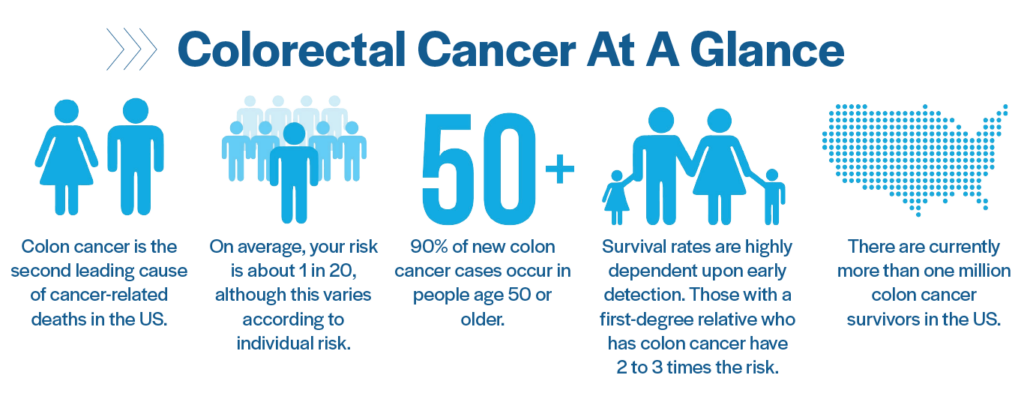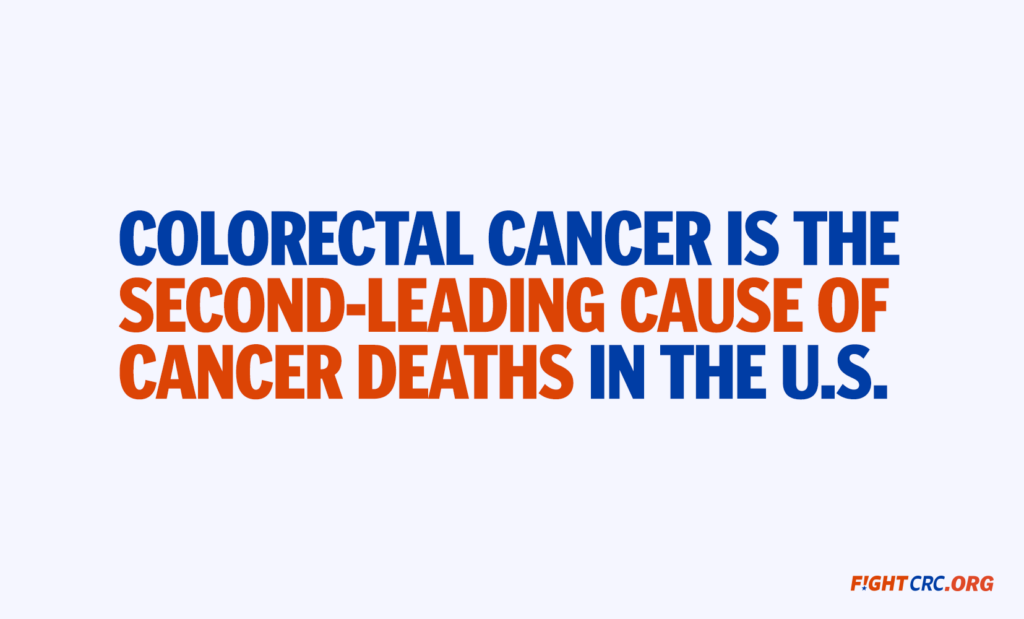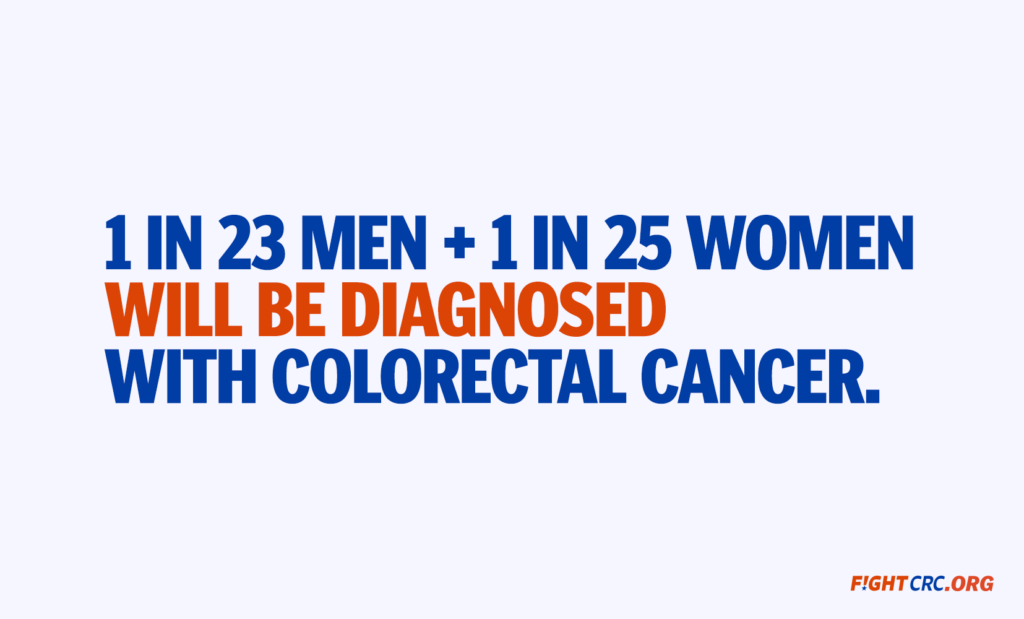Colorectal cancer is the second-leading cause of cancer death among men and women in the United States. But, in most cases, it can be prevented. Colon cancer can develop without any early signs. If it is caught early enough, 9 out of every 10 people can be cured. Regular screening is the best way to catch colon cancer early. These screenings are important for early detection and prevention. The American Cancer Society recommends that average-risk adults age 50 years and older undergo regular screenings.
All adults between the ages of 50 and 74 years should receive regular screenings as they are at the highest risk of developing colon cancer. People with a relative who has colon cancer have 2-3 times the risk of developing this disease, 25-30% of colorectal cancer patients have a family history of the disease.
1 in 3 people are not up to date with their colorectal cancer screening. HealthCore Clinic believes every patient deserves access to cancer screening and high-quality care, no matter their race, ethnicity, sexual orientation, gender identity, disability, religion, or socioeconomic status. There are affordable, take-home options that make screening easy. Getting tested today could save your life.
Contact us today to schedule a colorectal cancer screening test if you are over the age of 50 or have a history of gastrointestinal problems or disease symptoms.

What is a colorectal cancer screening?
A screening test is used to look for a disease when a person doesn’t have gastrointestinal symptoms. (When a person has symptoms, diagnostic tests are used to find out the cause of the symptoms.)
Colorectal cancer almost always develops from precancerous polyps (abnormal growths) in the colon or rectum. Screening tests can find precancerous polyps, so that they can be removed before they turn into cancer. Screening tests can also find colorectal cancer early when treatment works best.
There are two main types of colorectal cancer screening tests: Stool-Based and a Visual/Structural Exam.
Stool-Based Test
The multitarget stool DNA testing for colorectal cancer screening checks the stool (feces) for signs of cancer. These tests are less invasive and easier to have done, but they need to be done more often. These tests can be done in the privacy and convenience of your own home.
Visual/Structural Exam
These tests are performed by a medical specialist and look at the structure of the colon and rectum for any abnormal areas. This is done either with a scope (a tube-like instrument with a light and tiny video camera on the end) put into the rectum, or with special imaging (x-ray) tests.
When should you start screening for colorectal cancer?
Most people should begin screening for colorectal cancer soon after turning 50, then continue getting screened at regular intervals. However, you may need to be tested earlier than 50, or more often than other people, if…
- You, or a close relative, have had colorectal polyps or colorectal cancer.
- You have an inflammatory bowel disease such as Crohn’s disease or ulcerative colitis.
- You have a genetic syndrome such as familial adenomatous polyposis (FAP) or hereditary non-polyposis colorectal cancer (Lynch syndrome).
- If you think you are at increased risk for colorectal cancer, contact us or speak with your provider about when to begin screening, which test is right for you, and how often to get tested.
What are the symptoms of colorectal cancer?
Colon cancer can develop without any early signs, however, if it is caught early enough, 9 out of every 10 people can be cured. Being aware of the symptoms of colorectal cancer and understanding risks can help prevent this cancer from happening to you, or help you catch it as early as possible. Some of the early stages of colorectal cancer may not show any signs — this is why colorectal cancer screening is so important. If you have any signs or symptoms of colorectal cancer, do not ignore them, tell your doctor right away. Colon cancer symptoms and rectal cancer symptoms are very similar and can overlap. If you experience any of the following colorectal cancer symptoms, talk to your doctor as soon as possible.
- Rectal Bleeding
- Blood In Stool
- Ongoing Changes In Bowel Habits
- Stools That Are Narrower Than Usual
- Frequent Gas Pains
- Frequent Bloating
- Frequent Feeling of Being Full
- Frequent Abdominal Pain & Cramps
- Weight Loss (Without Reason)
- Tiredness
It’s not uncommon for individuals diagnosed in the early stages (stage I or II) to not experience any colorectal cancer symptoms. Symptoms of early-stage colorectal cancer are not always obvious or visible. Oftentimes it’s only when colorectal cancer has grown into late-stage cancer or spread that symptoms appear. That is why it is so important to schedule your colorectal cancer screening test now.

Colorectal cancer risk factors
A risk factor is anything that raises your chance of getting a disease. Some risk factors, like smoking, can be changed. Others, like a person’s age or family history, can’t be changed. It is important to note that having a risk factor, or even many risk factors, does not mean that you will get colorectal cancer. It is also important to note that some people who get the disease may not have any known risk factors. Researchers have found several risk factors that may increase a person’s chance of developing colorectal polyps or colorectal cancer.
- Being overweight or obese
- Not being physically active
- A diet that’s high in red/processed meats
- Smoking
- Alcohol Use
- Over the age of 50
- A personal history of colorectal polyps or colorectal cancer
- A personal history of inflammatory bowel disease
- A family history of colorectal cancer or adenomatous polyps
- Having an inherited syndrome
- Having Type 2 diabetes
- Your racial and ethnic background
- African Americans have the highest colorectal cancer incidence and mortality rates of all racial groups in the US.
- Jews of Eastern European descent (Ashkenazi Jews) have one of the highest colorectal cancer risks of any ethnic group in the world.
Shonnetta Gabriel
Hear what Shonnetta Gabriel, MSW, LAC has to say about working at HealthCore Clinic. Shonetta is the Director of Behavioral Health at HealthCore Clinic.
She shares her journey from intern to director as one of HealthCore’s longest-serving employees.
Colorectal cancer treatment
If you have colorectal cancer, the treatments most likely to help you will depend on your particular situation, including the location of your cancer, its stage, and other health concerns. Treatment for colon cancer usually involves surgery to remove the cancer. Other treatments, such as radiation therapy and chemotherapy, might also be recommended.
Colorectal cancer diet & nutrition
Nutrition can play a very important part in your treatment when you are diagnosed with colorectal cancer. Eating a well-balanced diet before, during, and after cancer treatment can help you feel better, maintain your strength, and shorten your recovery time. Here are some colorectal cancer nutrition tips:
- Maintain a healthy weight.
Treatments such as chemotherapy, radiation, and surgery for colorectal cancer can often contribute to unintentional weight loss. It’s important to avoid excess weight loss during treatment as poor nutrition status can cause decrease the body’s ability to fight infection. - Eat small, frequent meals throughout the day.Eating frequent small meals will ensure your body is getting enough calories, protein, and nutrients to tolerate treatment. Smaller meals may also help to reduce treatment-related side effects such as nausea. Try eating 5-6 small meals or “mini” meals about every three hours.
- Choose protein-rich foods.Protein helps the body to repair cells and tissues. It also helps your immune system recover from illness. Include a source of lean protein at all meals and snacks. Good sources of lean protein include:
- Lean meats such as chicken, fish, or turkey
- Eggs
- Low-fat dairy products such as milk, yogurt, and cheese or dairy substitutes
- Nuts and nut butters
- Beans
- Soy foods
- Oatmeal
Fruits and vegetables offer the body antioxidants, which can help fight against cancer. Choose a variety of colorful fruits and vegetables to get the greatest benefit. Aim to eat a minimum of 5 servings of whole fruits and vegetables daily.
Avoid fried, greasy, and fatty foods, Choose baked, broiled, or grilled foods instead. Healthy fats include:
- Olive oil
- Avocados
- Nuts
- Seeds
Wash your hands often while preparing food. Use different knives and cutting boards for raw meat and raw vegetables. Be sure to cook all foods to their proper temperature and refrigerate leftovers right away.
You may experience side effects that affect your ability to follow these suggestions. If you are struggling with any side effects, such as loss of appetite, nausea, diarrhea, vomiting, or any other nutrition concerns, your needs may be different. A registered dietitian can suggest nutrition guidelines that will be appropriate for your cancer journey.
Black Americans are at higher risk for colorectal cancer
- Black Americans are about 20% more likely to get CRC and about 40% more likely to die from it than most other groups.
- 1 in 41 Black males will die from colorectal cancer, compared to 1 in 48 White males. The risk is similar for women. 1 in 44 Black females will die from colorectal cancer, compared to 1 in 53 White females.
- Black Americans have the highest death rate and shortest survival of any racial and ethnic group in the U.S. for most cancers.
- Research shows that Black Americans are being diagnosed at a younger average age than other people.
- Therefore, experts suggest that Black Americans should begin their screening at age 45.
Colorectal Cancer Facts
- 1 in 23 men and 1 in 25 women will be diagnosed.
- In 2021, the American Cancer Society estimates that there will be 104,270 new cases of colon cancer and 45,230 cases of rectal cancer.
- There are over one million colorectal cancer survivors in the U.S.
- Colorectal cancer is the second-leading cause of cancer deaths month men and women combined in the U.S.
- 52,980 deaths from colorectal cancer are expected in 2021.
- At its most treatable (stage I), it’s 90% curable. But only 38% of CRCs are diagnosed at stage I.
- For those diagnosed before age 50, around 10% have late-stage disease (stages III and IV).
- Colorectal cancer is preventable with screening.
- 68% percent of deaths could be prevented with screening.
- The American Cancer Society Guidelines recommend screening starting at 45 years old.
- Always consult your doctor about which screening method is right for you.
- Affordable take-home testing options exist.
- A family history of colorectal cancer increases your risk.
- Between 25-30% of CRC patients have a family history of the disease.
- By knowing the risk factors, signs, and symptoms you can catch colorectal cancer at its earliest stage.
- If you are 45 or older you should talk to your doctor about screening. But:
- Anyone, at any age, can get colorectal cancer.
- Those experiencing signs and symptoms need a diagnostic exam.
- If you are 45 or older you should talk to your doctor about screening. But:
- Colorectal cancer vs Colon cancer
- Colorectal cancer starts in the colon or the rectum. These cancers can also be called colon cancer or rectal cancer, depending on where they start. Colon cancer and rectal cancer are often grouped together because they have many features in common.
- Colorectal cancer vs. prostate cancer
- Unlike colorectal cancer, in which multiple primary cancers may be diagnosed, prostate cancer is specific to the prostate gland. The prevalence of prostate cancer is higher than any other malignant cancers in men living in the United States.
- Colorectal cancer surgeons
- A Colorectal Surgeon is a physician who specializes in the diagnosis and treatment of anorectal and colorectal conditions (conditions of the colon, rectum and anus).
Many colorectal cancers can be prevented through regular colorectal cancer screening. Screening can find precancerous polyps—abnormal growths in the colon or rectum—so that they can be removed before they turn into cancer. Screening is important because when found early, colorectal cancer is highly treatable. Don’t wait, schedule your colorectal cancer screening today.
